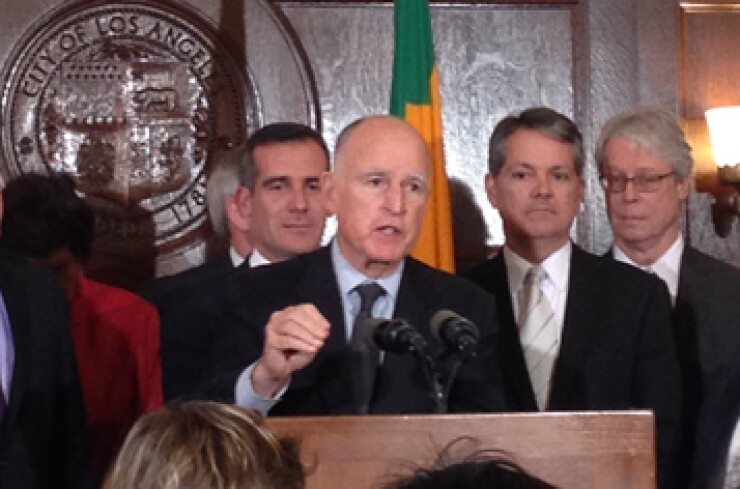
LOS ANGELES — Gov. Jerry Brown has proposed a constitutional amendment to make changes to California's Rainy Day Fund, which would include allowing the state to pay off debts faster.
Brown made the announcement on Wednesday, calling for a special legislative session to take up the changes later this month.
"We simply must prevent the massive deficits of the last decade and we can only do that by paying down our debts and creating a solid Rainy Day Fund," Brown said in a statement.
The proposal would replace the current Rainy Day Fund measure, Assembly Constitutional Amendment 4, set to go on the November ballot. ACA 4 was passed by the state legislature in 2010 as an effort to improve the state's current Rainy Day Fund, which was approved by voters nearly 10 years ago.
"We established our first Rainy Day Fund in 2004 with Proposition 58," State Department of Finance Director, Michael Cohen, said during a media briefing following the governor's announcement. "The last decade has shown us that the rules for putting the money in and taking the money out are too loose."
Under Proposition 58, funds can be withdrawn from the Rainy Day Fund for any reason and without limit. In addition, the state can suspend making deposits, as it has every year since 2007.
ACA 4 was established in order to improve the existing fund structure by tightening these rules.
"However that measure — as people have looked at it carefully over the past few years — has a number of shortcomings, including the lack of a realistic option to pay down our debts and liabilities," Cohen said. "Under ACA 4, we would entirely put away the money while at the same time continuing to struggle with those debts and liabilities."
The state currently has a $25 billion "wall of debt" from budgetary borrowing and deferrals, as well as $355 billion in retirement, deferred infrastructure maintenance, and other long-term liabilities.
For every year's required rainy day deposit, Brown's amendment would allow the Legislature and Governor to either put the money in the fund or to make supplemental payments to retire these debts faster.
Other shortcomings of ACA 4, according to the governor's office, include the "complicated formula" of historical revenue data on which deposits are based, as well as not addressing the ups and downs of Proposition 98.
Brown's amendment would base deposits into the fund on capital gains revenues. Such revenues that come in over 6.5% of general fund tax revenues would be deposited into the fund.
In addition, the proposal would establish a Prop 98 reserve for the first time in order to "smooth school spending to prevent the damage caused by cuts." The reserve makes no changes to the guaranteed funding level dedicated to schools under Prop 98.
Prop 98, which requires a minimum percentage of the state budget to be spent on K-12, accounts for around 40% of the state's spending on K-12 schools and community colleges, which ties school budgets to state revenues, Cohen said.
Brown's amendment would also raise the maximum size of the Rainy Day Fund to 10% from 5% of general fund revenues and limit withdrawals to make sure the state does not overly rely on the fund during a downturn.
During the first year of an economic downturn, withdrawals would be limited to 50% of the fund's balance.
Brown proposed in his budget to deposit $1.6 billion into the fund this year-the first time money will go in since 2007. He also proposed using another $1.6 billion to pay off the state's remaining economic recovery bonds.
"This year, whether or not our measure goes to the ballot, we're committed to building up a rainy day fund and will use whatever tools are available," Cohen said.
Assembly Speaker John Pérez, D-Los Angeles, welcomed the governor's call for a special session, saying they need to build a reliable way to deal with revenue spikes.
"We need to establish a solid system for saving money in good years, so that we can better weather the bad years," Pérez said. "We need a mechanism that not only strengthens our constitutional reserve, but also gets us off the rollercoaster ride of revenue spikes and dips that has caused so much trouble in recent years."
California Republicans in the legislature also applauded Brown's call for the special session, but remain skeptical of how easily the fund can be spent.
"While Republicans are open to alternatives to a bipartisan agreement passed in 2010, we want a strong 'locked box' that protects taxpayers' monies instead of a 'piggy bank' that can be raided on the whim of the majority party's desire to spend," said Republican Budget Committee Vice-Chair Jim Nielsen, R-Gerber. "This time, let's put the people of California first by stopping the budget roller coaster."
The special session is scheduled for April 24th. If passed by the legislature, the measure would go before state voters in November.





